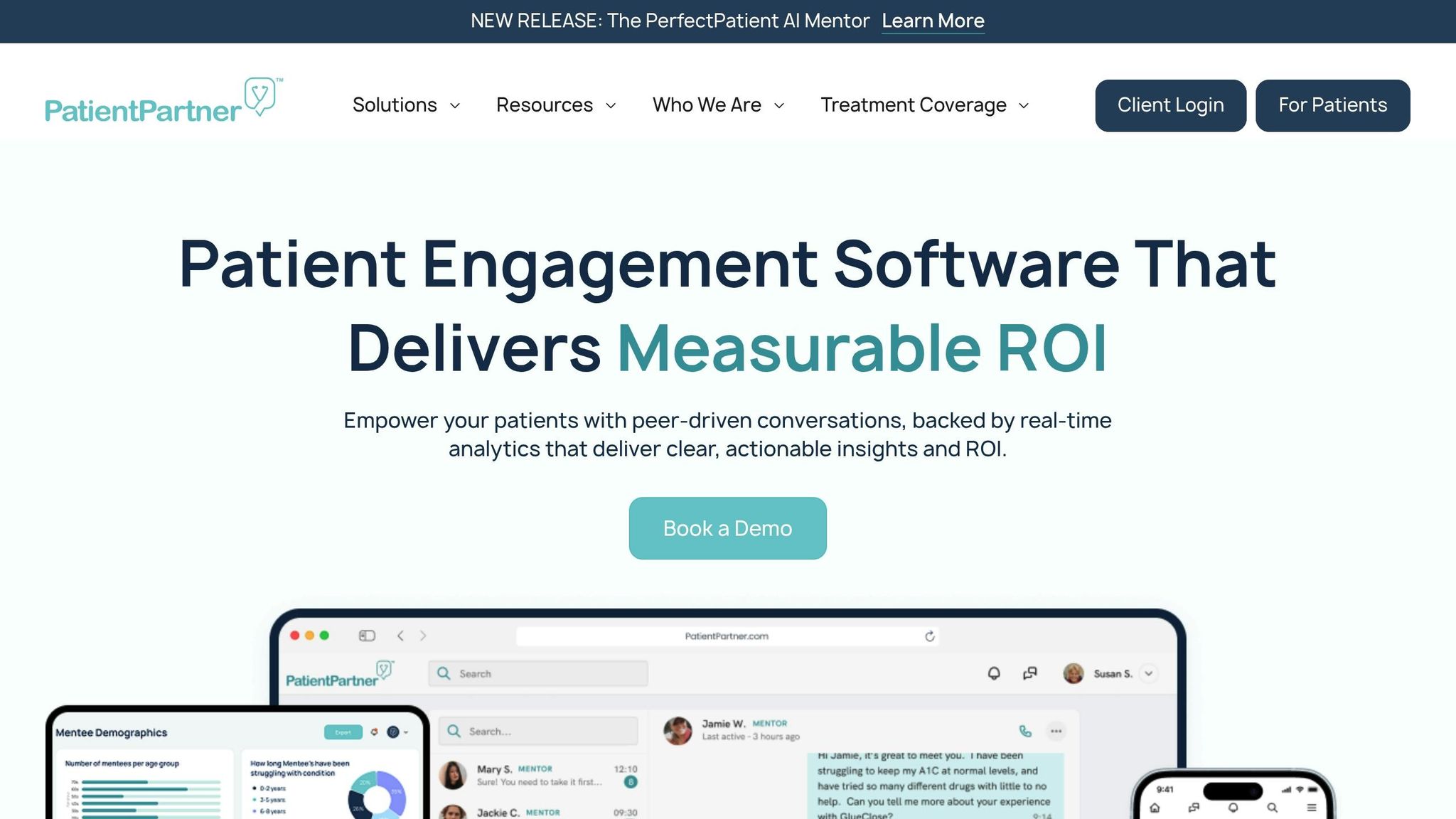Real-Time Mentorship and Ethical Consent


Key Takeaways
Real-Time Mentorship and Ethical Consent
Real-time patient mentorship is transforming how patients make healthcare decisions. By connecting patients with experienced mentors through secure digital platforms, this approach provides immediate, personalized support during critical moments. Here's why it matters:
- Improved Decision-Making: Patients paired with mentors are 68% more likely to start prescribed treatments and 90% more confident in their choices.
- Enhanced Consent Process: Mentors simplify complex medical details, help patients ask better questions, and align decisions with personal values.
- Better Treatment Adherence: Mentorship increases adherence by 29%, with patients staying on treatment an average of 133.5 days longer.
- Regulatory Compliance: Platforms like PatientPartner meet strict U.S. standards, including HIPAA, ensuring patient privacy and secure communication.
Mentorship bridges the gap between technical medical information and patient understanding, fostering trust and clarity while meeting legal and ethical standards.
Research Findings: How Mentorship Improves Informed Consent
Better Patient Understanding and Participation
Studies show that mentorship during the informed consent process helps patients better understand complex medical details, encourages active involvement, and clears up confusion about procedures, risks, and alternatives. Mentors provide real-time, personalized explanations, turning what might feel like a one-sided process into a meaningful conversation.
Virtual mentoring platforms add another layer of support by using visual tools and real-time discussions to break down medical jargon. Patients in these programs often feel more empowered to engage in discussions about their care, ask thoughtful questions, and express concerns.
"Patient Partner has been influential in helping patients understand the benefits of our product, providing them with personalized guidance and real-life experiences to support their decision-making." - Brad A., Mainstay Medical
Feedback from participants highlights a boost in confidence and engagement when making healthcare decisions. This deeper understanding plays a key role in informed decision-making, as explored next.
How Mentors Support Patient Decision-Making
When patients understand their options more clearly, their decision-making improves. Mentors provide tailored, unbiased advice that respects patients' autonomy. This peer-to-peer connection helps address common fears and uncertainties that might otherwise hinder decision-making.
Mentors often draw on their own experiences, offering relatable insights that help patients move from hesitation to confidence. Research backs this up: patients paired with mentors show a 29% increase in treatment adherence rates.
Unlike traditional methods that rely on pre-written materials, real-time mentorship delivers the guidance patients need, exactly when they need it most.
Documentation and Compliance Requirements
Improved understanding and decision-making also come with a responsibility to maintain accurate and compliant documentation. Healthcare providers must ensure all mentorship activities align with legal and ethical standards.
In the U.S., regulations require providers to secure documented consent for mentor involvement, including clear records of the mentor's role and how patient data will be handled. Consent forms need to specify these details to ensure transparency.
| Compliance Aspect | Standard Consent | Consent with Mentorship |
|---|---|---|
| Documentation | Standard consent forms | Additional mentorship consent required |
| Privacy Protection | Basic HIPAA compliance | Enhanced encryption and access controls |
| Record Keeping | Clinical notes only | Mentor interaction logs included |
| Patient Rights | Standard disclosure | Mentor role and data handling explained |
For research or quality improvement efforts, patient data can be de-identified, but this must be clearly communicated during the consent process. Healthcare organizations should also set clear guidelines for mentor involvement and have backup plans for any technical challenges.
Ethical Principles: Beneficence and Non-Maleficence
Acting in the Patient's Best Interest Through Mentorship
Real-time mentorship embodies the principle of beneficence by offering patients clear, empathetic guidance from seasoned mentors. It transforms the consent process from a routine clinical step into a meaningful dialogue where patients feel genuinely supported and understood.
Mentors go beyond simply providing medical details. They share their own experiences, helping patients grasp not only the technical aspects of their treatments but also what they might face emotionally and practically. This peer-to-peer connection fosters trust and empowers patients to make more confident healthcare decisions.
The idea of beneficence asks healthcare providers to actively promote the well-being of patients. Mentorship platforms address common barriers like fear and uncertainty, which can often stand in the way of informed decision-making. When patients connect with mentors who have firsthand experience with similar concerns, they’re better positioned to make choices that truly reflect their personal values and goals. This approach strengthens the informed consent process, ensuring care aligns with the patient’s best interests.
Reducing Risks and Preventing Harm
The principle of non-maleficence, or "do no harm", is upheld by mentors who help patients identify and address potential risks, misunderstandings, or anxieties before they escalate into negative outcomes. Acting as an extra layer of support, mentors can spot red flags and clarify confusion in real time.
For example, a 2025 neurologic physical therapy residency program utilized virtual mentoring sessions through HIPAA-compliant video platforms. These sessions allowed mentors to recognize when patients appeared confused or hesitant during consent discussions. By intervening early, they prevented patients from agreeing to procedures they didn’t fully understand, thus reducing harm.
Mentors also minimize risks through structured protocols, such as pacing the flow of information and undergoing specialized training. In the 2025 study, mentoring sessions included four hours of weekly engagement, with pre-briefs, patient care, and debriefs that documented informed consent and mentor involvement. This systematic approach ensured that risks were identified and addressed at multiple stages. Additionally, strong privacy measures further reinforced patient trust and minimized harm.
Protecting Patient Privacy and Confidentiality
Safeguarding patient privacy is a cornerstone of ethical mentorship. Effective mentorship platforms go beyond standard healthcare requirements by implementing robust privacy measures, such as HIPAA-compliant video streaming, secure data storage, and restricted access controls.
PatientPartner exemplifies this commitment with its full compliance to HIPAA, SOC 2, and ISO 27001 standards. Features like end-to-end encryption, role-based access, and audit trails ensure patient data remains secure.
"Compliance is at the core of everything we do. PatientPartner's platform is fully HIPAA and GDPR compliant, employing end-to-end encryption, role-based access controls, and audit trails to protect patient data. Our rigorous compliance framework ensures every interaction meets the highest regulatory standards, safeguarding both patient information and your organization's reputation." - PatientPartner
Automated oversight systems further enhance security by monitoring mentor-patient interactions, ensuring conversations stay appropriate and ethical. These systems maintain the balance between personal connection and professional boundaries.
For research or quality improvement purposes, patient data is de-identified, with transparent communication about how the information will be used. This clarity helps patients feel more secure about their data throughout the mentorship process.
Additionally, mentorship platforms emphasize cultural sensitivity by connecting patients with mentors who share similar backgrounds or speak their preferred language. This approach ensures patients receive support that respects their cultural context while maintaining strict confidentiality standards.
Implementation: Case Studies and Best Practices
Mentor and Patient Roles During Consent Process
Mentors serve as knowledgeable guides who simplify complex medical details and address patient concerns, while patients remain actively involved to uphold their autonomy. To meet legal and ethical standards, providers must document informed consent for mentor involvement, adhering to HIPAA regulations and organizational policies. Structured mentorship sessions typically include three key phases: pre-briefs to prepare for interactions, patient care discussions, and debriefs to ensure thorough support and accurate documentation.
Adding Mentorship to Clinical Workflows
Once roles are clearly defined, seamlessly integrating mentorship into clinical workflows can elevate the quality of patient care. Many healthcare organizations have adapted existing telehealth and language interpretation systems to include mentorship services. PatientPartner's platform, for example, integrates smoothly with current healthcare systems, maintaining HIPAA compliance through automated monitoring, which complements previously discussed regulatory measures.
Key practices for successful mentorship integration include scheduling sessions in private clinical settings to ensure patient confidentiality during virtual interactions. Additionally, staff training is essential - covering topics such as introducing mentors to patients, managing the technical aspects of virtual sessions, and properly documenting mentor involvement.
Comparison: Standard vs. Mentor-Supported Consent
A side-by-side comparison highlights the tangible benefits of mentor-supported consent compared to traditional methods. The table below illustrates these differences:
| Aspect | Standard Consent Process | Mentor-Supported Consent Process |
|---|---|---|
| Patient Confidence | Inconsistent, often limited | 90% more likely to feel confident |
| Treatment Initiation | Standard participation rates | 68% more likely to begin prescribed treatment |
| Long-term Adherence | Baseline adherence patterns | 29% improvement in adherence |
| Treatment Duration | Standard retention periods | 133.5 days longer on average |
| Patient Engagement | Passive information receipt | Active peer-to-peer interaction |
These figures underscore the advantages of mentor-supported consent. Organizations using mentor-driven platforms report a 30% rise in treatment adoption rates and a 20% boost in adherence within the first year.
"PatientPartner has been influential in helping patients understand the benefits of our product, providing them with personalized guidance and real-life experiences to support their decision-making." - Brad A., Mainstay Medical
Mentor-supported consent not only reduces misunderstandings and hesitation but also improves workflow efficiency by cutting down on callbacks, appointment cancellations, and treatment delays. Traditional consent processes, which often rely on static educational materials, can leave patients uncertain and hesitant. In contrast, mentorship provides real-time, personalized guidance tailored to individual concerns.
"We knew patient trust was shifting, but seeing just how dramatically patients now prefer peer-to-peer engagement over traditional methods is a game-changer for our upcoming strategies." - Sara W., Marketing Director at Rare Disease
Although documenting mentor involvement and patient consent adds extra steps, it strengthens legal protections and provides clear evidence of informed decision-making. This aligns with the ethical practices outlined throughout this research, reinforcing the importance of comprehensive and transparent consent processes.
sbb-itb-8f61039
PatientPartner: Supporting Ethical Real-Time Patient Mentorship

Platform Features for Ethical Consent Practices
PatientPartner’s enterprise SaaS platform connects patients with mentors who have firsthand experience with similar treatments. This approach ensures patients receive personalized insights during their decision-making process, going beyond generic educational materials to support informed consent in a meaningful way.
The platform features real-time, HIPAA-compliant communication tools that allow patients to connect with mentors through secure video and audio channels. This setup ensures patients can get immediate answers to consent-related questions, avoiding the delays often associated with traditional consent processes.
To uphold privacy and compliance, PatientPartner employs a comprehensive, compliance-ready infrastructure. This includes automated documentation of mentorship sessions, complete with timestamps and detailed records of interactions. The system uses end-to-end encryption, role-based access controls, and audit trails that exceed industry standards. With certifications like HIPAA, SOC 2, and ISO 27001, the platform ensures a secure environment. Automated oversight systems monitor every interaction to maintain strict regulatory compliance while safeguarding patient information and organizational integrity.
These advanced technical and compliance features not only protect patient data but also create an environment where patients feel supported and engaged.
Increasing Patient Engagement and Treatment Adherence
PatientPartner’s mentorship model directly addresses key barriers like fear, uncertainty, and lack of support, helping patients feel more confident about their healthcare decisions. By pairing patients with mentors who have lived through similar experiences, the platform builds trust and encourages informed participation in treatment plans.
Research highlights the platform’s measurable impact. Patients paired with mentors are 90% more likely to feel confident about proceeding with treatment, and those engaging with mentors are 68% more likely to start their prescribed therapies. These peer connections provide real-world insights that help clarify treatment benefits and alleviate doubts.
The long-term benefits are equally impressive. Mentorship programs have been shown to improve adherence by 29%, with patients staying on treatment an average of 133.5 days longer compared to those without mentor support. These improvements not only enhance patient outcomes but also reduce healthcare costs for pharmaceutical and med-tech companies.
Organizations using PatientPartner have reported substantial business results. For example, companies have seen a 30% increase in treatment adoption rates and a 20% improvement in adherence within the first year of implementation. In one case study, a med-tech company offering a new surgical device saw a 20% increase in completed consent forms and a 15% improvement in post-procedure adherence when patients were matched with mentors who had undergone the same procedure.
"PatientPartner has been influential in helping patients understand the benefits of our product, providing them with personalized guidance and real-life experiences to support their decision-making." - Brad A., Mainstay Medical
Scalable Solutions for Compliance and Growth
PatientPartner’s scalable platform is built to support compliance and growth across diverse healthcare settings. Its enterprise architecture accommodates multi-site deployments, offering centralized compliance monitoring and standardized mentor training for a wide range of patient populations and locations. The platform also includes robust user management tools, customizable workflows, and integration options tailored for large healthcare organizations.
The system’s mentor training program ensures that mentors are equipped with the skills and knowledge to communicate ethically, respect privacy standards, and support patient autonomy. Regular evaluations, feedback surveys, and compliance checks ensure mentors maintain high levels of professionalism and empathy, aligning with both ethical and regulatory requirements.
Organizations using PatientPartner can track key performance indicators such as new patient starts, consent completion rates, treatment adherence, patient satisfaction, and mentor engagement metrics. These insights help measure the effectiveness of mentorship programs in improving patient outcomes while meeting compliance and business objectives.
By automating compliance and providing personalized support, PatientPartner offers a scalable solution that balances patient engagement with regulatory requirements. This makes it an invaluable tool for pharmaceutical and med-tech companies navigating the complexities of U.S. healthcare regulations. The platform’s ability to integrate ethical informed consent with patient support ensures organizations can grow responsibly while maintaining trust and compliance.
"We knew patient trust was shifting, but seeing just how dramatically patients now prefer peer-to-peer engagement over traditional methods is a game-changer for our upcoming strategies." - Sara W., Marketing Director at Rare Disease
Teaching Consent Skills & Female Mentorship w/ Marlesha Bell, Ph.D., BCBA
Conclusion
Real-time patient mentorship is reshaping the way we approach ethical informed consent by offering patients personalized support and clear, clinically compliant guidance. The findings highlight how informed consent is evolving into a process that prioritizes patient understanding and empowerment. When patients have access to experienced mentors who can provide immediate, tailored advice, they make better-informed decisions and feel more confident in their treatment choices.
In fact, patients who engage with mentors are 68% more likely to begin treatment and 90% more likely to feel confident about their decisions. This boost in confidence comes from mentors addressing patients' fears, simplifying complex medical details, and sharing practical insights - areas where traditional consent processes often fall short.
The benefits of mentorship extend well beyond initial decision-making. Patients supported by mentors see a 29% increase in treatment adherence and an average treatment duration that is 133.5 days longer. These outcomes underscore how ethical consent practices not only improve understanding but also foster long-term commitment to care.
Platforms like PatientPartner show how technology can enhance human connection while maintaining strict compliance with HIPAA, SOC 2, and ISO 27001 standards. By integrating mentorship into clinical workflows, PatientPartner demonstrates that it's possible to combine regulatory compliance with improved patient outcomes.
This growing shift toward mentor-supported consent recognizes that informed consent isn't just about delivering information - it's about ensuring patients truly comprehend and feel empowered to act on that information. As healthcare continues to advance, real-time mentorship offers a way to create more ethical, patient-centered care that respects both patient autonomy and well-being.
For pharmaceutical and med-tech companies, the results speak for themselves: better patient adoption rates and improved long-term adherence show that ethical practices can also lead to sustainable business success. These findings reinforce the value of mentorship-driven approaches as a cornerstone of future patient care - one that balances doing right by patients with achieving meaningful outcomes.
FAQs
How does real-time mentorship enhance the informed consent process in healthcare?
Real-time mentorship enhances the informed consent process by pairing patients with mentors who have firsthand healthcare experience. These mentors offer tailored guidance, sharing their personal stories to help patients grasp their options, ask meaningful questions, and make well-informed decisions.
This one-on-one connection fosters trust and eases uncertainty, giving patients the confidence to make choices about their care. By offering clarity and emotional support, real-time mentorship ensures patients are not only informed but also actively involved in their healthcare decisions.
How does PatientPartner ensure compliance and protect patient privacy?
PatientPartner prioritizes patient privacy and data security by adhering to strict standards like HIPAA, SOC 2, and ISO 27001. To protect sensitive information, the platform uses advanced automated systems designed to monitor and secure data, ensuring it remains safe and confidential.
These efforts underscore PatientPartner's dedication to ethical practices and building trust, offering patients reassurance as they move through their healthcare journeys.
How does having a mentor improve patient confidence and adherence to treatment?
Mentorship programs, such as those offered by PatientPartner, have a powerful impact on patient confidence and their commitment to treatment plans. In fact, patients who engage with experienced mentors are 68% more likely to begin their prescribed treatment. Even more compelling, mentorship increases patient confidence by 90%, giving them the tools to make informed decisions while feeling supported every step of the way.
Through real-time guidance and sharing relatable experiences, mentors help patients tackle uncertainties head-on. This support ensures patients feel more assured and dedicated to following through with their treatment journey.
Author

Patrick Frank, Co-founder & COO of PatientPartner, leads healthcare patient engagement innovation through AI-powered patient support and retention solutions.







